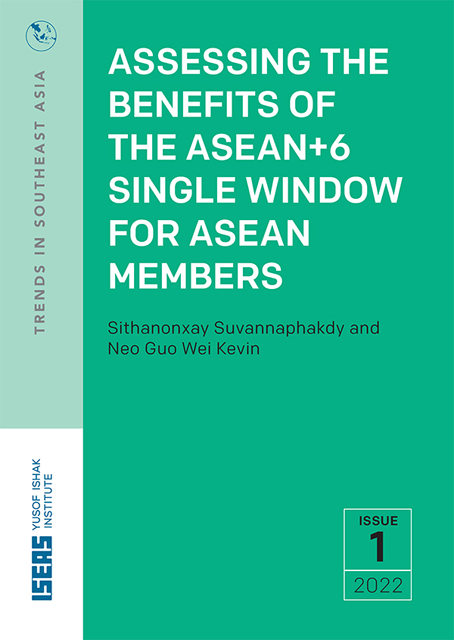Book contents
- Frontmatter
- Foreword
- Assessing the Benefits of the ASEAN+6 Single Window for ASEAN Members
- Assessing the Benefits of the ASEAN+6 Single Window for ASEAN Members
- Annex 1: Data on Trade Facilitation Measures
- Annex 2: Methodology for Estimating the Relationship between Trade Times and Crossborder Paperless Trade
- Annex 3: List of Countries Included in the Regression Model
- References
Assessing the Benefits of the ASEAN+6 Single Window for ASEAN Members
Published online by Cambridge University Press: 01 September 2023
- Frontmatter
- Foreword
- Assessing the Benefits of the ASEAN+6 Single Window for ASEAN Members
- Assessing the Benefits of the ASEAN+6 Single Window for ASEAN Members
- Annex 1: Data on Trade Facilitation Measures
- Annex 2: Methodology for Estimating the Relationship between Trade Times and Crossborder Paperless Trade
- Annex 3: List of Countries Included in the Regression Model
- References
Summary
1. INTRODUCTION
The application of technology and innovation in international trade procedures play an important role in making trade simpler, cheaper, more resilient and sustainable. One such initiative in ASEAN is the establishment and implementation of the national single window (NSW). The NSW is an electronic facility that allows parties involved in international trade and transport to submit all information needed to fulfil trade-related regulatory requirements at once and at a single-entry point (UNECE 2020). It enables traders and other economic operators (e.g., transporters, logistics firms, freight forwarders, customs brokers) to submit all information and documents required by different border authorities (e.g., customs, trade and commerce, healthcare, agriculture, standards) to one place or system, instead of making multiple submissions to multiple places or systems.
The key benefits of NSW are time and cost savings for both the public and private sectors. Trade information submitted to the NSW can be exchanged or made accessible to all of the relevant government authorities for processing (or be processed by the single window system itself), which eliminates the need for the business to make multiple submissions of the same information or documents. The authorities’ responses can be returned to the applicant via the same single-entry point. In the absence of an NSW, a business must approach each border authority separately—often physically at different offices or locations—and provide the information or documents that each authority requires, using that authority’s particular forms, procedures and systems.
In ASEAN, the member states have been developing the ASEAN Single Window (ASW) since 2005. The ASW creates an interoperable environment to connect and integrate ASEAN member states’ NSWs at the regional level. The establishment and operation of ASW have been supported by three regional agreements or protocols, namely the Agreement to Establish and Implement the ASEAN Single Window signed on 5 December 2005, the Protocol to Establish and Implement the ASEAN Single Window (Implementation Protocol) signed on 20 December 2006, and the Protocol on the Legal Framework to Implement the ASEAN Single Window (Legal Framework Protocol) signed on 4 September 2015.
The implementation of ASW has enhanced electronic exchanges of trade data and documents in the region. In 2020, all ASEAN member states joined the ASW live operation, which allowed more than 800,000 electronic exchanges of the ATIGA e-Form D through ASW for granting preferential tariff treatment among member states.
- Type
- Chapter
- Information
- Publisher: ISEAS–Yusof Ishak InstituteFirst published in: 2023



